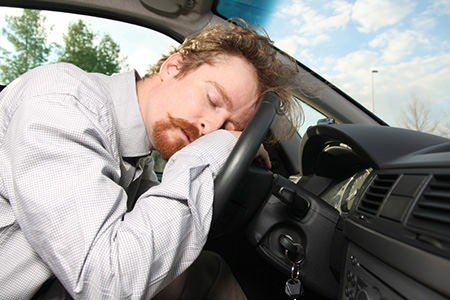
Ask any of your friends, and most will confess that they often operate a vehicle when drowsy. In fact, most don't even realize there is a problem with it. But according to the National Highway Traffic Safety Administration, sleepiness may cause over 100,000 crashes every year. That's an incredible number of crashes that are easily avoidable. Here we will discuss the dangers of driving while sleepy, when we are most likely to be at risk, and steps we can take to avoid it.
Sleepy Driving Compared to Drunk Driving
Sleepy driving is one of the biggest dangers, but it gets the least attention from drivers—many of whom admit to falling asleep at the wheel ten or more times in a year. In truth, driving while drowsy can be as detrimental as driving drunk. According to the American Automobile Association (AAA) Foundation for Traffic Safety, the effect of being awake for 17 hours causes a performance on psychomotor coordination tests equivalent to that of someone who has a blood alcohol level of 0.05 percent; if they stayed awake a full 24 hours, their test performance equaled a blood alcohol level of 0.10. Some states consider you intoxicated at 0.08; so drivers who have been awake for 24 hours would fail sobriety tests.
Experts say that drivers are often unable to determine their level of fatigue. They state that they are “tired” but do not realize they are in danger of running off the road or worse. Many drivers who are aware of their state of exhaustion refuse to do something about it.
Holidays are Especially Risky
The long days and nights of the holiday season can create more drowsiness for drivers. According to the Sleep Centers of Middle Tennessee, more than half of us are sleep deprived. In November and December, we stretch our already-too-long days and sleep even less, crowding out sleep in favor of early or late shopping, parties, or out-of-town guests. We may drive longer distances for these activities, creating even more sleep deprivation.
College students, who are usually studying for tests around the holidays, are especially vulnerable to sleep-related crashes. They may pull all-night study sessions, then drive several hours to get home afterward, Fourteen million people have admitted falling asleep at the wheel in the past year; it is no surprise that young adults from 18 to 29, and people with young children at home are the most likely to fall asleep at the wheel.
Tips to avoid driving like a Drunk
The AAA study determined that one of the most important deterrents to drowsy driving crashes is for us to be aware of it. If only one of the following is true, you are probably too sleepy to drive:
If you are planning to travel long distances, be especially sure to get a good night’s sleep the night before. Sleeping eight hours instead of five the night before a trip makes you three times less likely to be involved in a sleep-related crash.
Avoid alcohol and medications that may cause drowsiness. Most of these are marked on the bottle, but your own body may react differently. Be aware of the medications that cause sleepiness for you and ask your physician if they can be avoided for the duration of the trip.
Schedule regular stops, one about every two hours of driving time. Walk around or exercise during the break. Stretching, breathing cold outside air, and drinking cold drinks helps many drivers feel more alert.
If possible, take along a passenger who will stay awake and talk with you.
If you do become sleepy while driving, the best way to restore your alertness is to pull into a safe area and get some sleep; often a short nap of about 20 minutes in length will relieve the grogginess. Drinking caffeine may give you short term alertness. Many drivers say that rolling down the windows or listening to music with a fast beat helps, but that’s not supported by the study. Most of all—be careful out there!